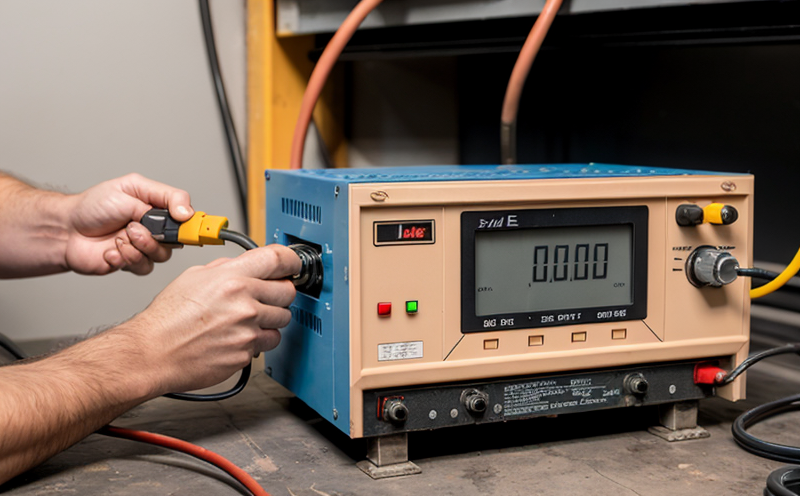IEC 60068 Die Electrical Stress Testing
The IEC (International Electrotechnical Commission) 60068 standard is a pivotal international guideline for ensuring the robustness and reliability of semiconductor devices under various environmental stresses. This service, specifically tailored to die-level electrical stress testing, focuses on evaluating the structural integrity and operational stability of individual die within integrated circuits.
Die electrical stress tests are conducted in controlled laboratory conditions that mimic real-world scenarios where components may be exposed to extreme temperatures, humidity, pressure, or other environmental factors. The objective is to assess how well each die withstands these stresses without compromising its functional integrity. This process is critical for identifying potential weaknesses early on, thus ensuring product quality and reliability.
During this testing procedure, engineers apply controlled voltage and current signals across the die's terminals to measure electrical characteristics such as leakage current, capacitance, resistance, and threshold voltage shifts. These parameters provide insights into the die's performance under stress conditions, helping manufacturers make informed decisions about design improvements or quality assurance.
The testing process involves thorough preparation of the samples, including cleaning and mounting them onto specialized test fixtures designed to simulate actual usage environments accurately. Once prepared, each die undergoes a series of tests aimed at simulating different types of stressors. For instance, temperature cycling can help determine if a die can function correctly after being subjected to rapid changes between hot and cold temperatures.
Another crucial aspect is the evaluation of the die’s response to moisture ingress or exposure to high humidity levels, which might affect its ability to operate reliably in harsh environments. Additionally, mechanical stress tests may be performed to assess how well a die can handle physical forces without damage.
The results from these tests are meticulously documented and analyzed using advanced software tools capable of processing large datasets efficiently. Analysts then compile comprehensive reports detailing the performance metrics observed during each test run along with any anomalies detected. These findings serve as valuable inputs for further development efforts aimed at enhancing product durability and reliability.
Compliance with IEC 60068 standards ensures that semiconductor manufacturers adhere to stringent quality control measures, thereby building trust among customers who rely on reliable electronic components for their products. By leveraging this service, companies can gain competitive advantages by delivering superior products that meet or exceed international safety and performance requirements.
In conclusion, die-level electrical stress testing is an indispensable tool in the semiconductor industry's quest for excellence. It enables precise evaluation of individual dies' resilience under varying environmental conditions, fostering innovation through continuous improvement processes based on empirical data gathered during these rigorous tests.
Why It Matters
The importance of IEC 60068 die electrical stress testing cannot be overstated. For quality managers and compliance officers, ensuring that every component meets the highest standards is paramount to maintaining a company's reputation for delivering reliable products. By adhering to these stringent tests, manufacturers can identify potential issues early in the development cycle, reducing costly rework or recalls later down the line.
For R&D engineers involved in new product introductions, this service offers invaluable data points that guide future iterations of existing designs or entirely new innovations. Understanding how different environmental factors impact die performance allows for more precise adjustments to materials selection and manufacturing processes.
From a procurement perspective, knowing that suppliers are subjecting their products to such thorough examinations instills confidence in purchasing decisions. It also facilitates better negotiation around warranty terms since buyers understand the level of assurance provided by compliant testing practices.
Applied Standards
| Standard | Description |
|---|---|
| IEC 60068-2-14 | High-pressure testing for semiconductors and integrated circuits. |
| IEC 60068-2-30 | Mechanical shock tests for semiconductor devices. |
| IEC 60068-2-49 | Rapid temperature cycling between hot and cold extremes. |
| IEC 60068-2-65 | Tests for high-voltage endurance of semiconductors. |
| IEC 60068-2-74 | Tests related to the effects of low temperatures on die performance. |
Eurolab Advantages
Eurolab stands out as a leader in semiconductor and microchip testing services due to its state-of-the-art facilities, experienced technical staff, and commitment to delivering accurate results consistently. Our team of experts employs cutting-edge instrumentation capable of performing the most precise die-level electrical stress tests available today.
Our advanced equipment allows us to simulate a wide range of environmental conditions more accurately than traditional methods, providing clients with reliable data for decision-making purposes. Additionally, Eurolab’s robust quality management systems ensure that all testing processes meet or exceed industry best practices, giving customers peace of mind knowing their investments are safe in our hands.
Moreover, we offer flexible turnaround times tailored to individual project needs while maintaining strict adherence to safety protocols throughout every stage of the testing process. This flexibility enables us to accommodate diverse client requirements efficiently without compromising on quality standards.





